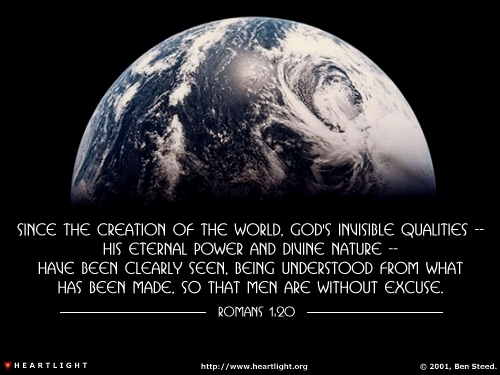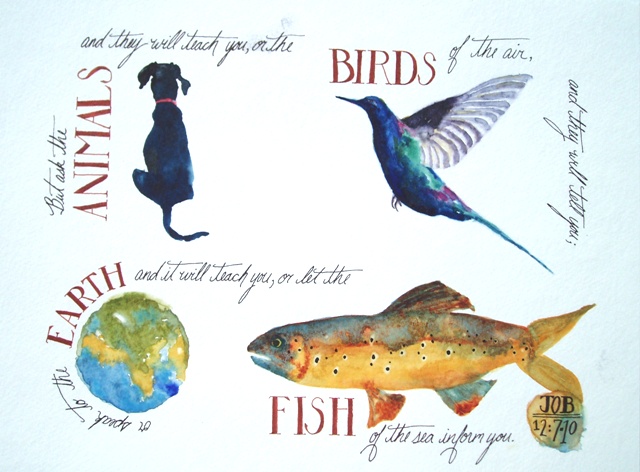Should we look to nature to help interpret scripture?
Scriptures suggests that we should look to Gods’ creation to help understand God. This is a view that has been held by generations of theologians, scientists and lay people. This has sometimes been described as the ”two books” doctrine. This doctrine holds that we have at least two witnesses to God, the Bible words, inspired by God, and nature, Gods creation. Both can teach us.
In the past “the book of Gods works”, creation has helped us correct our misunderstandings of “the book of Gods’ words”, the Bible. Perhaps the most famous of these corrections was heliocentrism. Folks held passages of the Bible such as these to mean that the earth is stationary and is circled by the sun.
–God] (w)ho laid the foundations of the Earth,that it should not be removed for ever. (Psalms 104:5 KJV)
– before him, all the earth: the world also shall be stable, that it be not moved. (1 Chronicle 16:30 KJV)
–Then spake Joshua to the LORD in the day when the LORD delivered up the Amorites before the children of Israel, and he said in the sight of Israel,Sun, stand thou still upon Gibeon; and thou, Moon, in the valley of Ajalon. And the sun stood still, and the moon stayed, until the people had avenged themselves upon their enemies. Is not this written in the book of Jasher? So the sun stood still in the midst of heaven, and hasted not to go down about a whole day. (Joshua 10:12-13 KJV)
It certainly appeared to an everyday observer that the earth does not move and that the sun circled it, so it was natural to read these and other verses in a geocentric light. It was the systematic study of the cosmos by folks like Galileo and Copernicus that pointed out the error. Galileo also famously noted that Gods works are less likely to be in error than our interpretations of the “inspired word of God.”
There are movements that suggest that where the evidence found in creation, such as the evidence that evolution happens and the earth is ancient, conflicts with their interpretation of scripture that they cannot have misunderstood scripture. They tend to deny the evidence found in nature, rather than question their understanding of scripture.
I’ve heard it said by young earth folks that the Bible can only be interpreted in light of the Bible and that no extra-biblical evidence should be used. I doubt that anyone can interpret any passage other than through the lens of their own understanding, but is it wrong to use the evidence found in the universe and this earth that God created? Does the Bible suggest that creation itself has nothing to say? Why have believers so long held that we should look to creation as well as scripture in order to understand the creator and to aid our understanding of scripture? Is it heretical to look to a other sources of information to increase our understanding the Bible?
Romans 1:20 suggests that even without the Bible we would be able to understand truth from nature and, in fact be able to be held accountable.
20 For since the creation of the world God’s invisible qualities—his eternal power and divine nature—have been clearly seen, being understood from what has been made, so that people are without excuse.” (NIV translation)
Psalm 19:1-4 also suggests that creation speaks eloquently of God.
“1 The heavens declare the glory of God; the skies proclaim the work of his hands. 2 Day after day they pour forth speech; night after night they reveal knowledge. 3 They have no speech, they use no words; no sound is heard from them.4 Yet their voice goes out into all the earth,their words to the ends of the world. In the heavens God has pitched a tent for the sun”. (NIVtranslation)
Is it wise to ignore the heavens and skies and the evidence God provides therein?
Habakkuk 2:18 says “Of what value is an idol, since a man has carved it? Or an image that teaches lies? For he who makes it trusts in his own creation; he makes idols that cannot speak.” The constructs that we make of our biblical interpretations, such as the young earth doctrines can easily be our own carvings, our own creations. Should we trust our creations before the evidence provided in Gods’ own creation?
Biology speaks to us of God, according to Job. “Ask the animals, and they will teach you, or the birds of the air, and they will tell you; or speak to the earth, and it will teach you, or let the fish of the sea inform you. Which of these does not know that the hand of the Lord has done this? In his hand is the life of every creature and the breath of all mankind.” (Job 12: 7-10, NIV)
According to the Psalmist, nature is created by, controlled by and sustained by God.
“Praise the Lord.[a]
Praise the Lord from the heavens;
praise him in the heights above.
2 Praise him, all his angels;
praise him, all his heavenly hosts.
3 Praise him, sun and moon;
praise him, all you shining stars.
4 Praise him, you highest heavens
and you waters above the skies.
5 Let them praise the name of the Lord,
for at his command they were created,
6 and he established them for ever and ever—
he issued a decree that will never pass away.
Praise the Lord from the earth, you great sea creatures and all ocean depths, lightning and hail, snow and clouds, stormy winds that do his bidding, you mountains and all hills, fruit trees and all cedars, wild animals and all cattle, small creatures and flying birds.” (Psalm 148:1-10 NIV)
So, according to the Bible, nature speaks to us of God. It is even a witness to God for folks who do not have scriptures.
What about the Bible? Does it suggest that it too can tell us of God? The Bible refers to Old Testament scripture this way. “All scripture is God-breathed and is useful for teaching, rebuking, correcting and training in righteousness.” We Christians include this passage itself and the rest of the New Testament in scripture that we feel is “God-breathed.”
We know that we humans can and do misinterpret scripture. We can also misinterpret nature. But, science, within its limited realm, is remarkably good at building and testing hypothesis that are undeniably true and correcting those that cannot be supported. Ultimately, creation itself speaks to us and can be used to help correct our misunderstandings. Scripture says that creation is Gods and is a witness to us.
I believe that all truth is Gods’ truth. If well evidenced truths such as evolution seem to contradict scripture, perhaps we should begin looking at the area where errors are most likely. We should begin by looking at our interpretation of scripture.
Other sources of information that Christians have historically used to aid their understanding of the Bible have included reason, theology, history, tradition and inspiration by the Holy Spirit. These too could be considered as acceptable extra-biblical sources.
Category: God's Word and the Natural World, God's Work and the Natural World, Science and the Church, Theistic Evolution, Uncategorized





